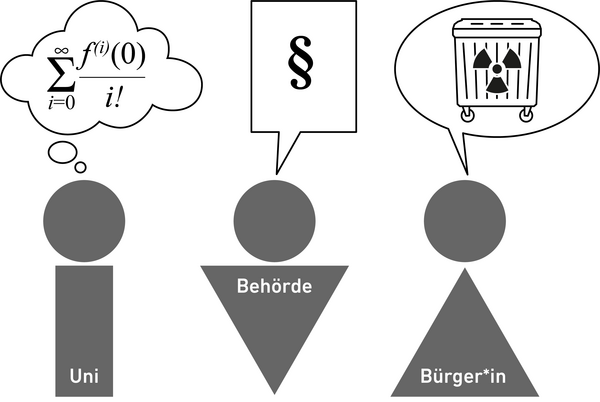Overview
Übersicht zur Transdisziplinaritätsforschung
The disposal of highly radioactive waste in the geological subsurface and the associated search for a site in Germany has been an ongoing project for more than 50 years. The technical challenges of the repository were increasingly joined by societal demands. The site search thus developed into a problem in which technical as well as societal issues must be considered.
The Site Selection Act (StandAG) requires that the public be involved in the search for and selection of a repository site. The further development of procedures for public participation is also desired beyond the legally regulated minimum requirements (§5 StandAG). This is where the TRANSENS project comes in. It offers a field of experimentation in which scientists and representatives of society (e.g. citizens, persons from authorities, associations, non-governmental organizations) jointly investigate the disposal problem. In this way, different perspectives, interests, experiences and bodies of knowledge are included in the research. Such a research approach makes it possible to work together to find a solution to the disposal problem. The goal is to link the best possible techniques and societal requirements (e.g., a fair site search process). This is intended to achieve a robust solution that takes into account the ideas and concerns of the public. This type of collaboration is referred to as transdisciplinary research. This research occurs in the TAPs (transdisciplinary work packages, i.e., DIPRO, HAFF, SAFE, TRUST).
In contrast, transdisciplinarity research examines this cooperation between science and society at a higher level. That is, it examines how (a) transdisciplinary research works, (b) what added value it can achieve compared to classical research approaches, and (c) what contribution it can make to solving the nuclear waste management problem. In addition, transdisciplinarity research provides the scientists* in the TAP with methods and tools to shape collaboration. Experiences are continuously collected and discussed with the scientists* in order to be able to make improvements in the collaboration.
The goals of transdisciplinarity research are:
- to follow and understand the development of new knowledge and approaches to solutions;
- To determine the benefits of collaboration to the disposal problem;
- To help scientists* collaborate with representatives from the community.
Questions of transdisciplinarity research are:
- What new knowledge is created through collaboration between science and society?
- Can the knowledge contribute to solving the nuclear waste management problem?
- What is the added value of this collaboration compared to previous purely disciplinary or interdisciplinary research without representatives from society?
- What are the disadvantages and limitations of this collaboration?
- Which forms of collaboration are suitable (e.g. type of workshop, methods)?
- What effects does the collaboration have on the participating representatives of society, the scientists, and the research?

